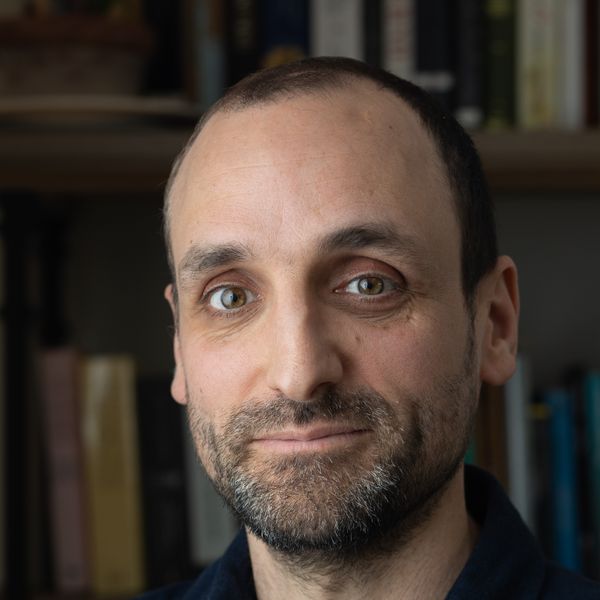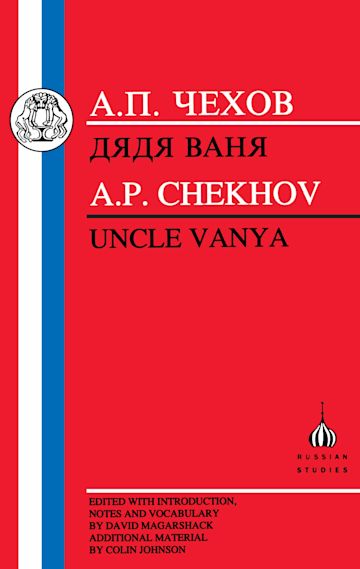BU Humanists at Work: Yuri Corrigan, Associate Professor of Russian & Comparative Literature
Dr. Yuri Corrigan, Associate Professor of Russian & Comparative Literature was one of two BU professors to be awarded a highly competitive 2024-2025 fellowship from the National Endowment for the Humanities. As a recipient, Corrigan will spend this academic year working on his book project, Chekhov’s Ethics: From Anesthetics to Antidotes. The book will explore Russian playwright Anton Chekhov’s (1860–1904) ethical thought. In what follows, Corrigan discusses his work, the personal connection he feels to Chekhov’s texts, and balancing the personal and professional demands of humanistic research.

“I think that there are certain texts,” says Corrigan, “that, when you read them, you feel like they’re addressed to you personally—like you can understand them without anyone explaining them to you.”
For Corrigan, those texts are works of classic Russian literature—Chekhov, Dostoevsky, and Tolstoy. Despite the scholarly attention that these works have already received, Corrigan’s personal connection to them leads him to new interpretations. Having considered works by Chekhov and Dostoevsky companions during his adolescence, he has integrated these texts and his personal connections to them into his academic career.
His ongoing NEH-funded project, Chekhov’s Ethics: From Anesthetics to Antidotes, will discuss the Russian playwright’s ethical thought. In the tumultuous times leading up to the Russian Revolution, Corrigan feels that Chekhov’s awareness that “the world around him was coming apart” can speak to the world today.
“He thought deeply and constructively about how to live in an unhinged society in the throes of culture war—on how to understand and resist the pull towards the kind of things that drive catastrophe, like fanaticism, polarization, and sectarianism.” For better or for worse, these sentiments repeatedly resonate with his students at BU—“I noticed that students were inspired by [Checkhov’s] way of seeing the world,” Corrigan says. “It spoke to them as a source of wisdom that was clued into many of the anxieties of our own cultural moment.”
These anxieties were similar to what Corrigan felt as an adolescent, when he used these pieces of classic literature to “stabilize” himself through his teens and early twenties. They helped “explain the world to him,” and even “explain himself to himself.” Corrigan’s connection to these companions—Chekhov, Dostoevsky, Tolstoy—allowed him to pursue original research on their works. “By the time you read what’s been written about them, it’s almost like hearing a friend or family member talked about by strangers. So there’s usually something that doesn’t feel right about what’s been said—something’s missing—and it seems so obvious to you because of your own relationship with the subject.”

With this reaction to scholarship, Dr. Corrigan had “something to defend,” and a “hunger” to find out everything that helped him explain these interpretations, creating the basis for his research agenda. “I felt this need to explain why Chekhov was inspiring and necessary for our time, so I gradually started this book.”
However, though the research process often begins with curiosity and passion, academia is a competitive place. The concept of professionalizing, which entails going to conferences, networking, and submitting papers to journals feels “almost antithetical” to the why of a career in the humanities: a love of literature and pursuing creativity. To reconcile the two sides of the academic coin, Corrigan prioritizes the ‘why’—”if you keep your eye fixed on what matters to you, and what you would study anyway, if it wasn’t your job . . . then going to conferences and networking don’t feel so much like professional activities but rather an extension of your own daily concerns and thoughts.” To Corrigan, it’s most important to find others who can meet him in these places and share ideas with mutual respect. That way, “it ends up feeling like a human endeavor and not some kind of intimidating professional mechanism.”
Corrigan also understands that students are often intimidated by fields like comparative literature, especially if they are completely new to it. Students often feel completely out of their depth, or that they are faced with faculty who know so much more than them that they are essentially unreachable. In his time at the department of World Languages & Literatures, he has engaged with numerous literary traditions: Korean, Chinese, Japanese, Persian, Arabic, Hebrew, German, Turkish, forcing him to think beyond his field and “grow in unexpected ways.” The diversity of literary traditions explored also meant that there was no hierarchy between scholars—“There’s something about how vast and complicated these fields are that it keeps professors humble……we know we can never get our heads entirely around it.”